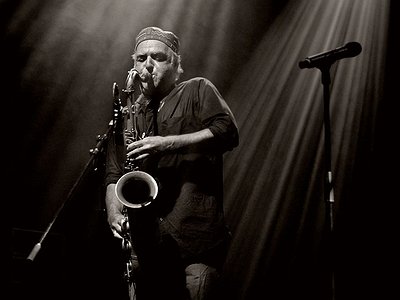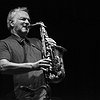Part 1
Name: Avram Fefer
Nationality: American
Occupation: Composer, improviser, saxophonist, clarinetist
Current release: Avram Fefer's Juba Lee, also featuring Marc Ribot (guitar), Eric Revis (bass) and Chad Taylor (drums) is out November 18th via Clean Feed.
[Read our Chad Taylor interview]
[Read our Eric Revis interview]
If you enjoyed this interview with Avram Fefer and would like to know more about his music, visit his official website. He is also on Facebook.
When did you start writing/producing/playing music and what or who were your early passions and influences? What was it about music and/or sound that drew you to it?
I started playing clarinet at age 8 in school at the suggestion of my mother, who had been a big Benny Goodman fan when she was young. I wouldn’t say I was gifted, but I was a hard worker and I always had a very strong emotional connection to music. My dad would often unwind on the weekends playing acoustic guitar — mostly spirituals, folks songs, songs of liberation, Yiddish love songs.
These songs spoke to me deeply on an emotional level. The sound of tragedy, love, perseverance, struggle, and fate. We would sing together and sometimes I would play my tiny bongo drums. Soon I was also jamming with my younger brother who was kind of a prodigy on the drum set. We had a little 3-piece band together called The Far-Out Four and played a couple concerts for the neighbors in our garage.
The movie and soundtrack to West Side Story was also a huge influence on me. The rhythms, the story, the feeling of the city (we were living in a quiet suburb of Seattle) were extremely evocative for my young soul.
Many years later I found out that I was probably conceived the night that my folks saw the original show on Broadway, which may or may not have had something to do with it!! Either way, Leonard Bernstein and Jerome Robbins were both geniuses and had my full attention …
Which artists, approaches, albums or performances involving prominent use of improvisation captured your imagination in the beginning?
I was introduced to the power of swing and improvisation through my high school music teacher, Leo Dodd, and my involvement in the high school jazz band. He turned us on to the big band music of Buddy Rich, Count Basie, and Woody Herman.
My first crush on a musician was Stanley Turrentine. His soulfulness, tone, and melodic sense captured my imagination in a way that is hard to fathom for a young first-generation American Jewish kid in a sleepy suburb of Seattle. I saved all my money to purchase his CTI albums and the posters of the cover art as well.
In college, it was Sonny Rollins Trio Live at The Village Vanguard. The elemental sound they produced as a trio became the prototype for my own performances for the next 10 years or so. I considered the trio of bass, drums, and sax to be the sufficient and ultimate vehicle for me to express myself.
Here is a trio version of my composition "African Interlude":
As I developed, I became obsessed with the music of Charles Mingus and Ornette Coleman, and this began to alter my trajectory significantly in a variety of ways. Eventually, I met and played duo with Ornette at his loft a few times which was something I had never dreamed of doing … I nearly passed out at the time from the impact of it.
Tell me a bit about your sense of identity and how it influences both your preferences as a listener and your creativity as an artist, please.
As the jazz musician son of a Jewish immigrant born in a Siberian labor camp, much of my work involves reconciling cultural influences.
I have lived abroad on several occasions, speak several languages, and my involvement with Indian, Arab, Jewish, and African ensembles has affected nearly everything I do as an artist. Specifically, my work has been inspired by my Semitic ancestry and my life-long embrace of African-American musical heritage, from Spirituals to Stevie Wonder, Earth, Wind and Fire, Sun Ra, and the Art Ensemble of Chicago.
Here is an example of these two cultural strains in my piece, "Testament".
What, would you say, are the key ideas behind your approach to music and art?
My music continues a long and proud lineage of Jewish and African American collaboration in the field of Jazz. Our repertoire is deeply rooted in blues, spirituals, and songs of Liberation, while our personal stories reflect the intertwining narratives of our prodigious cultures.
In the same way that America represents a place where people can come and take chances, I try to establish a sense of safety in my music within which we can challenge and provoke the audience. I believe in making them feel comfortable before we can expect them to be open to our ideas, but I take very seriously my role as provocateur in the world, trusting that what we are doing with music can be (r)evolutionary and transformative.
My work features powerful, groove-based, melodic, and improvisatory exploration. I like to juxtapose strong sensations --- joy and grief, simplicity and complexity, hope and desperation, structure and freedom, lyricism and chaos. The audience is put at ease, drawn in, immersed, challenged, provoked, and slowly transformed. They come away with a sense of open-mindedness, empathy, courage, and awareness at having partaken in an unexpected journey.
In this way, my music is not only engaging, but also hopefully a catalyst for social and spiritual change. A good example here is my tune, "Essaouira":
While my music is not overtly political, the underlying spiritual power and message is meant to open the audience to the vastness and diversity of life, to illuminate what makes us uniquely human and to rejoice in all that we are capable of. Reaching deeply into myself, I think of my instrumental voice as cantorial, or preaching, using the stage or studio as a form of multi-cultural prayer.
In addition, the potential for spontaneous improvisation to erupt at any moment presents a source of excitement and artistic danger that serves as a crucial buttress against today’s tightly controlled musical world.
Focusing on improvisation can be an incisive transition. Aside from musical considerations, there can also be personal motivations for looking for alternatives. Was this the case for you, and if so, in which way?
Improvising basically just means living in the moment; experiencing and participating deeply in the world around you. I believe that engagement is the key to a meaningful life. Otherwise, why are we here?
Musically, I love spontaneous ‘free’ improvisation, but I also am a great believer in composition. In the past, I was pretty insecure as a composer, but after many years of people commenting on how much they get from my composing, I have come to realize that the two are nearly indistinguishable for me. My improvising is really just extended spontaneous composition, and my composing is really just a slowed-down, edited version of my improvising.
My simple tune, "Loss (for Flo)", demonstrates this interplay:
More and more, I find that good composing provides vehicles for improvising and creative band interaction. In addition, composing gives me a chance to integrate many of my global musical influences in a way that can be more powerfully conveyed to the audience. From there, the improvisations can take on greater meaning and context.
There is definitely no freedom in life without structure.
What, would you say, are the key ideas behind your approach to improvisation? Do you see yourself as part of a tradition or historic lineage?
Narrative and personal expression are they key elements for me in musical improvisation.
Ultimately, I consider myself a storyteller, so everything I do musically is meant to connect somehow with the audience or listener in a way that brings them along with me for the ride. Ornette once told me “Don’t play notes, play sound.” That is a great way to think about it.
We are part of this vast amazing universe and have the chance to use everything at our disposal to express ourselves, so we should practice to develop the tools to do just that. Some people sound like they are taking music out of the universe; I want to put music in to the universe.
The way I see it, my job as a front man is to listen to the other guys and let them play me. I am there to channel what I am hearing and feeling into a part of the overall musical story being created in real time by the whole ensemble.
“Bedouin Dream”, from my new album, Juba Lee, captures this well.






